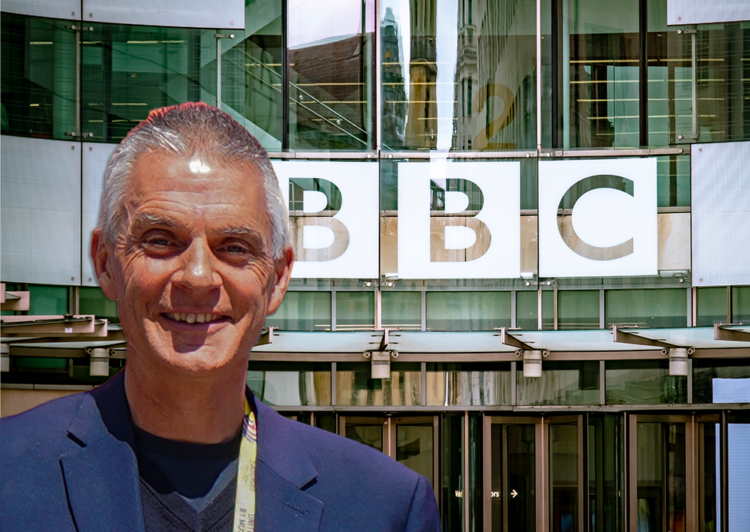100% Media 0% Nonsense
Everything about the BBC’s decision to launch ads on podcasts in the UK seems political, writes the editor-in-chief.
“Social security is the third rail of American politics. Touch it, and you die.”
“That’s ’cause the third rail’s where all the power is.”
It’s been 20 years since since that exchange between President Bartlet (Martin Sheen) and his chief advisor Toby Ziegler (Richard Schiff) was broadcast in The West Wing, but it remains just as true today.
Some things are so politically controversial that it takes an extremely brave politician to even raise the issue in public, let alone try to do something about it.
The BBC, and how it is mostly funded by an unusual form of UK taxation called a licence fee, is the British equivalent of a third rail issue. Even the current Conservative government and its revolving door of far-right, libertarian, anti-immigrant goons have not dared to actually legislate a removal of the licence fee.
Likewise, the BBC has never dared to introduce advertising into its UK funding model. Until now.
But why?
The BBC is desperate
The cliché remains true: desperate times call for desperate measures.
It’s easy to forget just how poorly the BBC has been treated in recent years, despite being one the UK’s most widely used and most-trusted brands.
But since 2010, the Conservative government has squeezed the organisation’s settlement to the point where highly paid talent have fled for the commercial sector, local radio has suffered deep cuts, the World Service TV and radio output has moved to online only and flagship programmes like Newsnight have been greatly altered.
After a decade of salami-slicing, the BBC’s funding had been cut by 25%, but it still wasn’t enough for the desperately incompetent culture secretary Nadine Dorries, who has come the closest to trying to have the licence fee abolished. Lucky for us, she and her malevolent patron Boris Johnson were so useless at being politicians that they soon destroyed themselves and were thrown out of government.
Now, despite director-general Tim Davie recently claiming that he “welcomes” the BBC’s latest six-year settlement, the corporation must find another £500m in annual savings after the licence fee was frozen for two years and, from this year, will only benefit from below-inflation increases.
No wonder, then, the BBC has confirmed it is considering plans to include ads on its podcasts for UK listeners on Apple and Spotify platforms.
The unthinkable has become, frankly, completely understandable.
BBC plan to commercialise podcasts ‘could be catastrophic’
Time for a new funding model?
You only need to listen to last week’s episode of The Media Leader Podcast to get a sense of how polarising the issue is.
Columnist Nicola Kemp, with whom I normally agree so much, sees the issue very differently.
“The BBC needs to diversify its commercial model,” Kemp said. “We’ve seen a big push-back against the licence fee… I understand that we do have, as a country, quite an uncomfortable relationship with advertiser-funded content… But does that mean that advertising [and] BBC Studios’ commercial model is a bad thing for the industry? Absolutely not.”
Kemp is right to remind people that BBC Studios, its commercial division, is already a huge global seller of advertising and is an international media success story.
In the last five years, BBC Studios has doubled revenues and profits, with the BBC’s latest annual report showing record revenue in 2022/23 of £2.1bn — about double the income of Channel 4 — and profits of £240m. And that is despite it being considered “controversial” to run ads outside the UK when BBC Studios’ predecessor BBC Worldwide launched them on bbc.com in 2007.
So the BBC has already diversified its funding model and has more commercial people working for it than ever before.
A step too far
However, launching ads in the UK, even in a very limited way that is not likely to generate a huge amount of income, is a step too far.
By definition, it undermines the necessity for the licence fee and it’s a perversion of the BBC’s mission as set out in the charter: to “act in the public interest, serving all audiences through the provision of impartial, high-quality and distinctive output and services which inform, educate and entertain”.
Or, as EssenceMediacom’s joint chief strategy officer Geoff de Burca says: “One of the great strengths of the UK radio industry is the well-balanced contrast and competition between public and commercial sectors. This threatens to put this out of kilter.”
And that’s specifically why the Daily Mail and Rupert Murdoch-owned newspapers’ vitriolic campaign against the BBC has been flat wrong to suggest that the BBC “crowds out” commercial opportunities in the UK.
I’ve spoken privately about this issue many times with commercial leaders of broadcasters like ITV, Channel 4, Sky, Global and Bauer, not to mention countless media agency executives, who all pretty much say the same thing: the BBC is a wonderful creative engine whose presence makes commercial broadcasting better. Not only by increasing the quality of journalism and entertainment programming, but by developing new formats that organisations obsessed with the bottom line would not have thought of.
One well-known radio executive couldn’t believe the BBC’s plan was true when it was first reported by Murdoch’s The Times. Alas, she confides: “The BBC told us they think they can do it… We think they are inadvertently opening up a conversation they don’t want to have about licence fee.”
But, hold on. Maybe that conversation is precisely what the BBC wants right now.
Shock horror
We must never forget that the BBC is run by a former Conservative politician.
Davie stood as a councillor for the Conservative Party in the Hammersmith and Fulham London Borough Council elections in 1993 and 1994, and was deputy chairman of the Hammersmith and Fulham Conservative Association in the 1990s. All this while rising up the ranks as a brand marketer at Procter & Gamble and PepsiCo.
So it’s not a massive leap to suspect that the BBC is using UK podcasts to “test the waters” and see what the reaction is.
From a cynical point of view, you could argue it’s a win-win strategy: either the UK public clamours to the defence of a publicly funded BBC and argues for greater licence fee increases, or the response is muted and the Tory marketer-in-chief confirms his place in history by becoming the first to fully commercialise the BBC.
But neither of these outcomes does anything to protect the BBC’s long-term value as an independent, multi-platform and distinctive media owner that adds so much creativity, professionalism and dynamism to our sector.
The problem with the “third rail” analogy is that you don’t always instantly die after broaching the unbroachable. The shock of last week’s news is already dissipating, but the longer-term damage to the BBC by launching ads in the UK could be terminal.
 Omar Oakes is editor-in-chief of The Media Leader
Omar Oakes is editor-in-chief of The Media Leader
100% Media 0% Nonsense is a weekly column about the state of media and advertising. Make sure you sign up to our daily newsletter to get this column first in your inbox every Monday, as well as key updates with what’s happening at The Media Leader and our upcoming events.
The end of the media ‘power broker’
Media can lead us out of our anti-family society
Why Mediapalooza won’t happen this year





 Omar Oakes is editor-in-chief of The Media Leader
Omar Oakes is editor-in-chief of The Media Leader